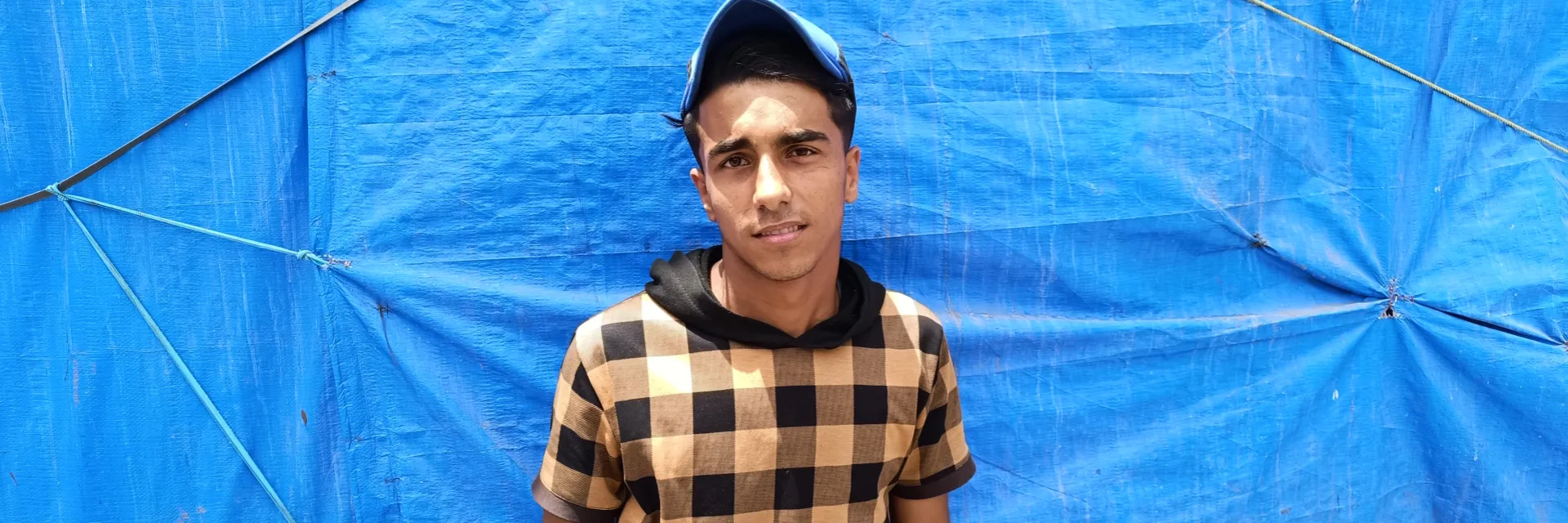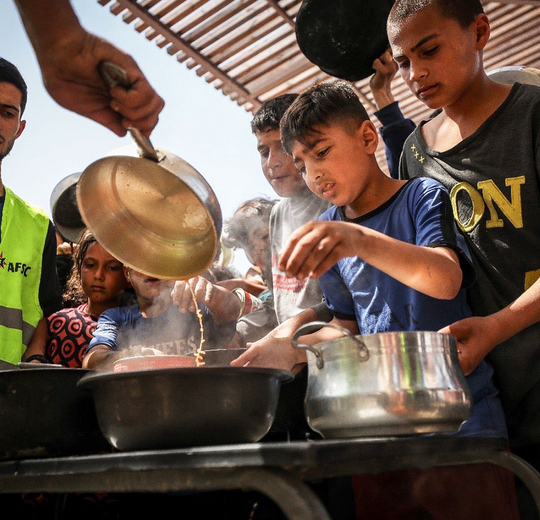My name is Mohammed Ali Al-Bibi, I am 17 years old, a tenth-grade student. I used to live with my family in our house in the Zaytoun neighborhood in Gaza City. Our life was peaceful and beautiful before the war, but everything changed during this war, and I lost everything I had.
Since the martyrdom of my family, I have been in a bad mental state, losing focus, and suffering from nervous shock. I wish everything I've been through was just a dream, and I would wake up to find my family with me.
The crime committed by the occupation forces against my family is not unique among the thousands of crimes inflicted on the Palestinian people since the occupation of Palestine in 1948. However, the crimes committed during this war are particularly massive and heinous, beyond description. I’ve lost everything beautiful in this war. I’ve lost every member of my family and my home. Now, I am all alone, without family, friends, or a home.
This is a summary of my experience during this war. I am Mohammed Ali Al-Bibi, a 17-year-old tenth-grade student. I used to live with my family in our house in the Zaytoun neighbourhood of Gaza City. Our life was peaceful and beautiful before the war, but everything has changed, and I’ve lost everything I had.
My story began when my sister, Zuhwa, called me. She and her family had fled in the early days of the Israeli war on Gaza to a school for displaced people run by UNRWA in the Nuseirat camp after their house was bombed and completely destroyed by the occupation. She asked me to bring diapers and some necessities for her baby daughter. I got what she needed and set out from our house in Gaza City to the Nuseirat camp on foot.
The Israeli occupation forces were stationed near the Martyrs’ Junction on Salah al-Din Street, dividing Gaza into two sections. I passed by the occupation vehicles while carrying a white piece of cloth and the diapers and milk for my niece. I saw many bodies lying on the ground and witnessed dozens of martyrs. The occupation allowed some civilians, including me, to pass, subjecting us to thorough inspection.
After a difficult journey, I reached the school-turned-shelter and gave my sister the supplies for her baby daughter. On the same day, I returned to Salah al-Din Street to go back to my home and family in the Zaytoun neighbourhood. However, the occupation forces prevented us from passing and fired bullets at us, instructing us to return from another street. When we arrived four kilometres [two-and-a-half miles] away on foot, the occupation forces prevented us from passing again. I returned to my sister at the school-turned-shelter in the Nuseirat camp.
My brother Ismail had arrived at the school in Nuseirat a few days before my sister. In late December 2023, Ismail left the school-turned-shelter and headed to the Malaysian Quranic school on the northern outskirts of the Nuseirat camp, wanting to be closer to Gaza City. Every day, Ismail tried to return to Gaza City, but the occupation forces fired at him. They had infiltrated the Magra’ah area and the entire Zahraa neighbourhood. Despite this, Ismail was deeply connected to our mother and siblings and wanted to return to our family.
Occupation forces on the outskirts of Wadi Gaza fired directly at Ismail, aged 20, and my cousin Khamees Ahmed Al-Bibi, aged 23, on their last attempt to return to Gaza City. Khamees was killed instantly by a bullet to his chest and was identified by the ID card he had in his pocket.
My cousin Khamees was buried, but for the past five months, we have heard nothing about my brother Ismail. Some say he was martyred and buried in the sands after the northern Nuseirat area was raided and the Malaysian school destroyed. Others say he was detained by the occupation forces. I search for Ismail every day, but I know nothing about him. I hope he is still alive, and we can continue our lives together.
Communication with my family was through mobile phones, but it was difficult due to heavy blockage on the mobile network. I bought a SIM card from a national company, but still, communicating with my family was very difficult. My mother constantly reassured me, asking me to stay in the school and take care of myself. But the occupation’s missiles killed my mother, and everyone else in my family.
On Tuesday, 20 February 2024, the occupation forces bombed my family’s house in the Zaytoun neighbourhood, destroying it. All the members of my family were martyred. The occupation killed my father, Mohammed Ali Al-Bibi, 44 years old; my mother, Mona Al-Zarad, 42 years old; my brother Ali, 24 years old; my brother Ayman, 14 years old; and my brother Zaher, ten years old. Also martyred in the bombing were my uncle Ahmed Al-Bibi’s family, including his wife and their sons, Mohammed, 18 years old, and Saqr, 12 years old.
The occupation committed a large massacre against my family by bombing our house in the Zaytoun neighbourhood. Everyone in my family home was a civilian, and there is no justification for the occupation to have committed such a heinous crime against them. I lost my entire family and was left alone. Due to poor communication, I only learned about my family’s martyrdom ten days after the occupation’s crime. Since then, I have been suffering from severe psychological shock. I cannot comprehend how to continue my life alone. I couldn’t bid them farewell or participate in their burial. The occupation killed the entire rest of my family, and I still don’t know whether my brother Ismail was killed or arrested. I live in constant worry and in a bad mental state.
Since January, I have been living with my sister Zuhwa, 26 years old; her husband Mohammed; and their children: Sabah, eight years old; Mona, six years old; Rahef, three years old; and the infant Aziz, ten months old, who was born shortly before the war. We are all displaced as the occupation destroyed our homes and killed our family.
My sister and her children sleep in one of the school’s classrooms along with about ten other families. My sister’s husband sleeps with the men in a separate building designated for them. I couldn’t find a space for myself to sleep in the men’s building, so I sleep in a tent in the school-turned-shelter’s courtyard. We are facing difficult living conditions. We need water, food, and cleaning supplies. We need everything, but we only have a small mattress and blanket shared by multiple people for sleeping.
The school-turned-shelter’s management distributes food assistance to us, but it is minimal. They distribute only one bar of soap per family, which is not sufficient. We don’t have clean water, and we don’t have clothes. We have been wearing the same clothes we were displaced in months ago. We have been wearing these clothes throughout autumn and winter, and now throughout spring.
When the occupation forces invaded the central Gaza camps in early January 2024, most families living in the school-turned- shelter’s left and fled to Deir al-Balah and the southern Gaza Strip. However, we refused to be displaced again for several reasons. Firstly, we didn’t want to face displacement again, and secondly, we didn’t have the money to move to another place. We decided to stay inside the school-turned-shelter despite the great danger we faced.
We lived in the school for three weeks in extreme danger. The occupation vehicles were very close to the school, and the quadcopter drones roamed inside the school and fired at anyone moving. My sister’s husband Mohammed, Adham, and I were shelled with an artillery shell while baking bread in the school yard. We left the bread and ran into the classrooms, and by God’s grace, we survived the shelling.
During those three weeks, we couldn’t find enough food. Our neighbours would send us whatever was left of their food. We couldn’t find flour, and we couldn’t find water for drinking or other uses. We lived for three weeks without food or drink, which was very harsh on us, especially on the children. We have been short of flour since the beginning of the war, barely managing to provide one meal a day for ourselves. We bake over the fire, but the amount of bread is insufficient due to the scarcity of flour. We try to ration its use so that one bag of flour lasts for several days.
Before the war, I was a student in the tenth grade, and after school, I used to work with my father in the tailoring profession. I helped him with household expenses. However, I lost my job during the war. I lost my father and all the other members of my family. I worked in the Nuseirat camp in a meat shop, but after the camp was invaded, the employer fled to Rafah, and I lost my job. Currently, I live only on humanitarian aid like the rest of the residents of the Gaza Strip.
My dream is to continue my education and return to my home in Gaza City. I hope to find the burial place of my family and visit their graves as soon as I return to the Zaytoun neighbourhood. I dream of finding my brother Ismail alive. Many people tell me he was martyred, but I feel he is still alive, and I hope he is. I hope to be able to rebuild our house and start a family, from which I will have children whom I will name after my father, mother, and martyred siblings.
Since the martyrdom of my family, I have been in a bad mental state, losing focus, and suffering from nervous shock. I wish everything I’ve been through was just a dream, and I could wake up to find my family with me. I can’t believe everything that has happened, and I no longer comprehend reality. My last communication with my family was a week before their martyrdom, and I lost my phone after their death. I sleep in a tent for displaced people. The war must stop, and the occupation must be held accountable for its heinous crime against my family.
Take action now
Tell Congress to demand lifesaving aid for Gaza
The humanitarian crisis in Gaza has reached catastrophic levels. Since March 2, 2025, Israel—with full support from the U.S.—has severely restricted food, water, medicine, and humanitarian aid from entering Gaza.
Contact
If you have questions or concerns, please contact us at gazaunlocked@afsc.org.





